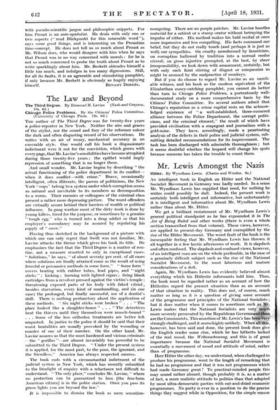The Law and Beyond Chicago Police Problems. By the Citizens'
Police Committee. (University of Chicago Press. 13s. 6d.) TILE author of The Third Degree was for twenty-five years a police-reporter in New York. Neither the airs and graces of the stylist, nor the sound and fury of the reformer colour the dark and often disgusting record of his observations.- He writes with . an air of weary, mechanical accuracy in an execrable style. One would call his book a dispassionate indictment were it. not for the conviction, which grows with every page, that Mr. Lavine's sensibilities have become atrophied during those twenty-five years ; the epithet would imply repression of something that is no longer there.
And small wonder. Mr. Lavine begins by describing " the actual functioning of the police department in its conflict— when it does conflict—with crime." Brave, occasionally intelligent, often illiterate, the pawns of politicians, the New York "cops"- belong to a system under which corruption seems as natural and inevitable to its members as decomposition to a worm. Their enemies or colleagues of the criminal class present a rather more depressing picture. The worst offenders are virtually secure behind their barriers of wealth or political influence. In gang warfare most of the dirty work is done by young killers, hired for the purpose, or sometimes by a genuine " tough egg," who is turned into a drug addict so that his employer's ascendancy may be assured by regulating his supply of " snow."
Having thus sketched in the background of a picture with which one can only regret that Swift was not familiar, Mr. Lavine attacks the theme which gives his book its title. He emphasizes the fact that the Third Degree is a matter of rou- tine, not a measure resorted to only in exceptional cases. " Solutions," he says, " of about seventy per cent. of all cases where solutions are finally attained come as the result of using forceful or persuasive methods in some form." " Some form " covers beating with rubber tubes, lead pipes, and " night sticks " ; kicking ; burning with lighted cigars ; firing blank cartridges from a revolver pressed against the victim's temple ; threatening exposed parts of his body with faked vitriol ; besides starvation, every kind of manhandling, and (in one case) the prolonged, but finally successful, use of a dentist's drill. There is nothing perfunctory about the application of these methods. Six night sticks were broken " . . . " The place looked like a slaughter-house " . . . " The detectiVes beat the thieves until they themselves were muscle-bound " . . . Sonic of the less orthodox treatments are better left unquoted. In justice to the police it should be said that their worst brutalities are usually provoked by the wounding or murder of one of their number. On the other hand, Mr. Lavine assures us that the most hardened and vicious criminals —the " gorillas "—are almost invariably too powerful to. be submitted to the Third Degree. " Under the present system it is applied, for the most part, to the poor, the ignorant, and the friendless." America has always. respected success.
The book ends with a circumstantial indictment of the judicial system in New York, which has recently submitted to the limelight of enquiry with a reluctance not difficult to understand. " The only place," concludes Mr. Lavine, " where no protection can be guaranteed to him , [the free-born American citizen] is in the police station. Once you pass-its green lights you are beyond the law."
It is impossible to dismiss the book as mere sensation- mongering. There are no purple patches. Mr. Lavine handles material for a satirist or a stump orator without betraying the impulse of either. His method makes his bald recital at once more impressive and less compelling. His facts command our belief, but they do not really touch (and perhaps it is just as well) our sympathies. On cruelty unredeemed by fanaticism, on corruption hallowed by tradition into a normal modus vivendi, on gross injustice prompted, at the best, by sheer irresponsibility, we look down with amazement, certainly, but with only such faint stirring of disgust or compassion as might be aroused by the malpractice of monkeys.
But if you do choose to regard Mr. Lavine as an unreli- able witness, and his book as the modern equivalent of the Elizabethan coney-catching pamphlet, you cannot do better than turn to Chicago Police Problems, a portentously well- documented study on a more comprehensive basis by the Citizens' Police Committee. Its several authors admit that Chicago's reputation as a crime capital rests on the acknow.. ledged existence of " a well-established, three-comered alliance between the Police Department, the corrupt politi- cians, and the criminal element," the result of which have provided civilisation with a scapegoat and journalism with a gold-mine. They have, accordingly, made a penetrating analysis of the defects in their police and judicial system, sub- mitting detailed recommendations for its improvement. The task has been discharged with admirable thoroughness ; but it seems doubtful whether the leopard will change his spots because someone has taken the trouble to count them.














































 Previous page
Previous page